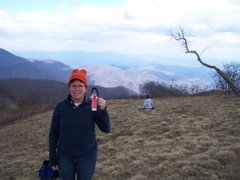Summit Charter School, in Cashiers, NC, continues to utilize its TTEC curricula, and this year they focused on service
projects along the A.T. in the Standing Indian area. Last fall, Summit built an
informational kiosk at the Rock Gap Shelter.
This kiosk is maintained by students from all grades at the school and serves hikers with information on the flora, fauna, and resources of
the area, and information about the school.
From year to year, all classes K-8 rotate displays and help maintain
the kiosk at the shelter using topics that are covered in the respective
grades’ place-based curriculum. These
may include such things as identification of trees, flowers, and salamanders, as
well as, examples of local cultural heritage, excerpts from student nature
journals, artwork, and poetry for hikers to enjoy and learn from. Funds from the NC license plate grant are used to
purchase camping equipment such as tents and lanterns that will enhance the
students’ experiences and be extremely useful to the continued development of Summit
Charter School’s place-based program.
In September the 8th grade visited the A.T. on a field
excursion as “Citizen Scientists” to collect data on the quality of the water
at various streams and springs along the trail.
This will be the sixth consecutive year that Summit Charter School has
partnered with the Nantahala Hiking Club in order to assist the organization
with their participation in the World Water Monitoring program. The students conduct
water quality tests at six specific sites where A.T. hikers typically refill
drinking water. Other activities
students experience during this field trip include a salamander diversity program. Students discuss salamanders as indicator
species and their importance to the unique temperate rainforest habitat of Western North Carolina as they collect data on species abundance and diversity
in streams where water is tested. The
students visit several A.T. shelters, read and add to journal entries, learn Leave No Trace ethics, hike for several miles on the A.T., visit the Albert
Mountain Fire Tower, and interact with hikers.
The data collected, information learned, and reflections on their
experience will be placed in the kiosk along with information from other Summit
students for the fall season.

